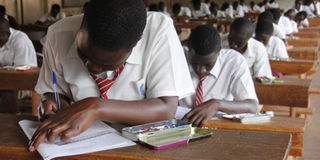Exam malpractice : Who are the real culprits?

Teachers should be more passionate about nuturing and influencing their students to be productive , independent and honest citizens rather than manufacturing ‘good grades’ through exam malpractise. Net PHOTO
What you need to know:
Everytime Uneb releases results, it has to withhold some results because of exam malpractice. Can there be an end to this trend?
Benon Tumusiime, a parent whose child, Joyce Tumusiime sat for Primary Leaving Exams at Martyrs Way Primary school in Namugongo last year, was worried when he heard that Uganda National Examination Board (Uneb) had withheld results of 1,512 candidates who sat for the 2019 Primary Leaving Examination (PLE) due to examination malpractice.
He hoped to God that his child’s school was not among those with withheld results. Fortunately, it was not.
In fact, turns out Joyce had scored Aggregate Six.
Tumusiime is among the many parents across the country who are still celebrating their children’s success in last year’s PLE.
Fake exam papers
Unfortunately, not everyone is celebrating. Among the unhappy are those whose results were withheld because of examination malpractice.
Many of these were duped by unscrupulous people who claimed to have copies of leaked exam papers. Some even circulated these fake exam papers on social media.
“This is not the examination we were expecting,” are some of the reactions that victims of these unscrupulous individuals wrote on their exam scripts.
Dan Odongo, the Uneb executive secretary revealed this two weeks ago, when the results were released.
Daily Monitor of November 4, 2019 ran a story titled, ‘Six arrested over selling fake PLE papers’.
In the story, it was reported that the culprits would charge between Shs 400,000 and Shs10million for the papers and some schools had already fallen victim.
On September 3, 2019, Daily Monitor published another expose on the same subject titled, ‘New details emerge on Uneb exam leaks’. The story which was based on an investigation on leaking of examination papers by some Uneb ‘officials’, indicated that the perpetuators included individuals involved in setting and packing the examinations before they are dispatched to exam centres, caterers and clergy who are said to access the premises with minimal security scrutiny.
However, Odongo, later released a statement dismissing the these findings saying these were baseless accusations by disgruntled current and former employees bent on smudging the reputation of the national examinations body.
Odongo insisted that security measures put in place by Uneb were good enough, also stressing that during the printing period, there’s hardly any contact between the people inside the printing press and those outside.
Probable causes
Bena Nabugede, a teacher at Cornerstone Primary School in Mukono District, faults school administrators who do not invest enough in preparing candidates and at the end want to cheat. Nabugedde points out that some people fabricate papers to earn quick money and also adds that exam malpractice is exacerbated by cut throat competition among schools.
“Schools are now businesses, especially private ones. They will do anything to be on top,” she explains.
Nabugedde warns that the consequences are dire, especially for the students who are ‘helped’ to pass exams because many times they fail to live up to the standards of the secondary schools they report to. She adds that this may go as far as university where students may fail to complete courses.
“We are going to get artificial lawyers and doctors because of this,” she warns.
According to Emmanuel Binaisa, a parent who is still celebrating his son’s impressive performance, exam malpractice could be a result of collusion between ‘insiders and outsiders’ at the exam body.
Binaisa’s theory is that there is connivance between school administrators and external exam invigilators.
Beatrice Seruyange, the headteacher at New Hope Primary School in Wakiso District, also cites competition as the main cause of examination malpractice.
“Schools want to show that they are better than the rest. The teachers instead of preparing their pupils for a better future focus on how to cheat. Many don’t even bother to complete the syllabus,” she notes.
Seruyange also belives it is because of vices such as exam malpractice that there are half-baked graduates.
“We need to go back to the drawing board,” she says, adding that there’s need to actually teach and then wait for the result. We need to face reality; it is better for a pupil to get Aggregate Eight than score a fake Aggregate Four,” she stresses.




